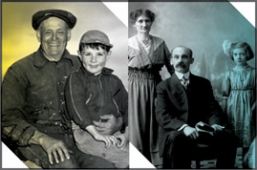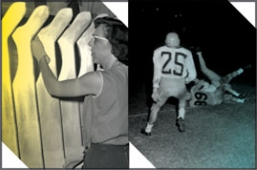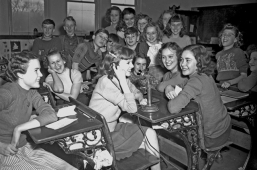The 4th Floor will be closed from 9 am-2 pm tomorrow, Friday, February 13, for a special event. Makerspace and Newcomer Learning Centre will remain open. Floors 2 and 3 are available for study and work. www.hpl.ca/central
Starting the week of February 9, renovation preparations are underway in anticipation of the March 2 start. Computer availability may be limited, and the Living Room space is closed. Renovations are expected to wrap up by late Spring. Thank you for your patience.
Renovation preparations are underway in anticipation of the March 2 start. Starting the week of February 23, the 2nd Floor will be closed. The Children's collection will be temporarily available on the 1st Floor. Renovations are expected to wrap up by late Spring. Thank you for your patience.
All HPL Branches are closed on Family Day, Monday, February 16. Bookmobile is off the Road. Extended Access and Study Hall is not available. Regular service hours resume on Tuesday, February 17.
Starting Tuesday, February 10, the First Floor Living Room will be unavailable due to renovation preparations. Study and work spaces are available on Floors 2-3.
Please note the Noon Hour Concert on Friday, February 13, will be held at Terryberry Branch instead.
Thank you for your patience.
Please note the following Bookmobile visit updates.
Friday, February 13
Winona (11am-Noon) - Cancelled
Queen Victoria (3-4pm) - Cancelled
Family Day, Monday, February 16
Bookmobile is off the road.
Tuesday, February 17
McMaster University (3:30-4:30pm) - Cancelled
Thursday, February 19
Rockton (10:30am-11:30am) - Cancelled
Bennetto 5-5:30pm (instead of 4-5:30pm)
The accessible washroom at Carlisle Branch is not working. We aim to get it fixed quickly.
Effective Sunday, February 1, Sunday service hours at Central Library will be paused.
Sunday Hours will continue at Dundas, Red Hill, Terryberry, Turner Park, Valley Park and Waterdown Branches from 1-5pm.
Accessibility Policy
Policy Purpose
The purpose of this policy is to ensure that the Hamilton Public Library provides library services, resources and facilities in ways that are accessible to persons with disabilities. It provides a framework for compliance with the requirements of the Ontarians with Disabilities Act (ODA) and the Accessibility for Ontarians with Disabilities Act (AODA) and addresses specific areas required by the Integrated Accessibility Standards regulation associated with the AODA. This Policy applies to all persons who provide library services including employees, volunteers and all other persons that provide goods, services or facilities on behalf of the Library.
Key Points Summary
- The Hamilton Public Library is committed to providing Library services that are accessible to all persons who wish to obtain, use, and benefit from Library services. Library Services will be relevant, inclusive, and responsive to community needs. Each member of the community, including persons with disabilities, has an equal opportunity to use and/or to be employed by the Hamilton Public Library.
- The Library will provide accessible customer service that respects the dignity and independence of persons with disabilities. The Library will strive to provide library services that meet the specific needs of persons with disabilities, and services that are convenient and accessible.
- The Hamilton Public Library will provide communication supports and accessible formats and it will incorporate accessibility design, criteria and features when procuring or acquiring goods, services or facilities, except where it is not practicable to do so.
- The Hamilton Public Library is committed to providing employment accommodation processes for library employees and job applicants. The Library will notify its employees and the public about the availability of accommodation for job applicants and for employees with disabilities.
- The Library will meet the accessibility needs of persons with disabilities in a timely manner. When communicating with a person with a disability, the Library will do so in a way that takes into account the person’s disability, as directed by that individual.
Definitions
- “Accessible formats” may include, but are not limited to, large print, recorded audio and electronic formats, braille and other formats usable by persons with disabilities.
- “Assistive devices” are any products, instruments, equipment or technological aids used by persons with disabilities to help prevent, compensate, relieve or neutralize a disability. They may include Braille recorders, recording devices, Bliss symbolics boards or devices, and more.
- A “barrier” is anything that prevents a person with a disability from fully participating in all aspects of society because of their disability, including a physical barrier, an architectural barrier, an information or communications barrier, an attitudinal barrier, a technological barrier, a policy or a practice.
- “Communication supports” may include, but are not limited to, captioning, alternative and augmentative communication supports, plain language, sign language and other supports that facilitate effective communications.
- "Disability" means:
- any degree of physical disability, infirmity, malformation or disfigurement that is caused by bodily injury, birth defect or illness and, without limiting the generality of the foregoing, includes diabetes mellitus, epilepsy, a brain injury, any degree of paralysis, amputation, lack of physical co-ordination, blindness or visual impediment, deafness or hearing impediment, muteness or speech impediment, or physical reliance on a guide dog or other animal or on a wheelchair or other remedial appliance or device,
- a condition of mental impairment or a developmental disability,
- a learning disability, or a dysfunction in one or more of the processes involved in understanding or using symbols or spoken language,
- a mental disorder, or
- an injury or disability for which benefits were claimed or received under the insurance plan established under the Workplace Safety and Insurance Act, 1997.
- any degree of physical disability, infirmity, malformation or disfigurement that is caused by bodily injury, birth defect or illness and, without limiting the generality of the foregoing, includes diabetes mellitus, epilepsy, a brain injury, any degree of paralysis, amputation, lack of physical co-ordination, blindness or visual impediment, deafness or hearing impediment, muteness or speech impediment, or physical reliance on a guide dog or other animal or on a wheelchair or other remedial appliance or device,
- “Service animal” refers to an animal used by a person for reason relating to their disability. An animal is a service animal for a person with a disability if,
- The animal can be readily identified as one that is being used by the person for reasons relating to the person’s disability, as a result of visual indicators such as the vest or harness worn by the animal; or
- The person provides documentation from one of the following regulated health professionals confirming that the person requires the animal for reasons relating to the disability: \
-
A member of the College of Audiologists and Speech-Language Pathologists of Ontario;
-
A member of the College of Chiropractors of Ontario;
-
A member of the College of Nurses of Ontario;
-
A member of the College of Occupational Therapists of Ontario;
-
A member of the College of Optometrists of Ontario;
-
A member of the College of Physicians and Surgeons of Ontario;
-
A member of the College of Physiotherapists of Ontario;
-
A member of the College of Psychologists of Ontario; or
-
A member of the College of Registered Psychotherapists and Registered Mental Health Therapists of Ontario. O. Reg. 165/16, s. 16
-
-
A “support person” is another person who accompanies a person with a disability to help with communication, mobility, personal care or medical needs or with access to goods, services or facilities.
















